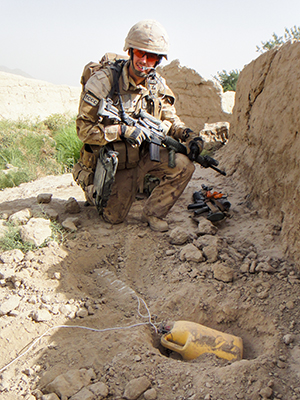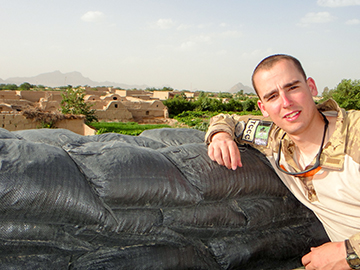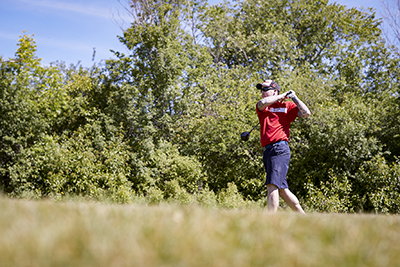Sometimes the trajectory of a life is altered by the smallest of episodes. And sometimes change is triggered by a more significant event – like when a roadside bomb explodes and picks you up, throws you into a wall, laces half your body with shrapnel, rips a hole the size of a grapefruit in your face and forever more robs you of the sight in one of your eyes.
Let us introduce you to recent Communitech student ambassador and current software developer William Werth.
This weekend, William Werth will tee up a golf ball for Canada at the St. George’s Golf and Country Club in Etobicoke, part of a 90-member contingent of former Canadian soldiers taking part in the Invictus Games, an international sporting event for armed forces personnel who were wounded or injured in the course of their duties. The event’s patron is Prince Harry, himself a former soldier who served for Britain in Afghanistan.

Former Canadian Forces combat engineer
William Werth in Afghanistan in 2010.
(Image courtesy of William Werth)
Werth gained entry to the Invictus Games courtesy of the events of July 1, 2010, and Happy Canada Day to you, too, when the former combat engineer found himself in Afghanistan’s Panjwayi District, site of some of the most intense combat of the Afghanistan campaign. It’s there that Werth’s life took a sharp right turn.
“We were on patrol and the infantry sergeant on the day was walking back past the patrol and I remember looking at him and saying something, and then he stepped on a [hidden bomb] right beside me,” said Werth, sitting in a Communitech office last week, his hands folded politely in front of him.
The force of the blast tore the legs from his sergeant’s body. Werth, suddenly flat on his back, recalls members of his unit hovering over him, giving him morphine. He recalls stepping aboard, under his own power, a U.S. Blackhawk evacuation helicopter, and he recalls arriving at Kandahar Airbase and then scissors cutting the Canadian uniform from his body. And then the lights went out. He awoke four days later in a NATO hospital in Germany with a life that required literal and figurative reconstruction.
“I’d always wanted to be a soldier,” said Werth.
“I like helping people. I like seeing a measurable outcome based on what I’m putting in. In the military, you can immediately see you’re part of a team and [that] everything you do has a direct effect on the outcome of [the task at hand].
“Everyone has a role to play and if you don’t do your job, the pyramid will fall, right? I liked that aspect of it. I like to be challenged.
“When I got in, I loved it.”
Today, Werth, a recent graduate of Conestoga College’s software engineering program, is a manager at a Kitchener firm called James E. Wagner Cultivation. The company grows medical cannabis under licence from Health Canada. Werth, born in Guelph, raised in Waterloo, looks after all its technology, including the slick software, some of which he developed himself, that monitors the status and health of the cannabis plants as they grow.
“I’m in charge of all internal process improvement, through app development, sensor networks, all to augment the growing process and making it better,” said Werth. “Humidity, temperature control, CO2 control, all the pieces that can turn our internal rooms into smart rooms so we can grow the best product.”

William Werth, enjoying a quieter moment during
his tour in Afghanistan. (Image courtesy of William Werth)
You would not know if he did not tell you about the life he once led in the military. About the things he witnessed and experienced. About the wounds he sustained, psychological and otherwise. The gaping hole that was once nearly half his face has healed marvellously. The scars up and down his left side are mostly beginning to fade.
“My wife still thinks I’m handsome,” he said with a gentle laugh, “so that’s good, right?
Yes. It’s all good.
Werth was a corporal, attached to an infantry unit. His job was find and disable IEDs, improvised explosive devices, placed by the Taliban in their war of insurgency against the NATO forces arrayed against them. On his first patrol he found himself alone, flat on his stomach in the Afghan dust and 40 C heat, probing the ground with his bayonet, looking for the buried roadside bomb his detection equipment had flagged, when a firefight broke out.
“I remember clear as day rounds hitting the compound around me, hitting the ground,” he said. “I basically did this roll thing into a ditch, got up to run, and then I realize I have none of my kit, [because] you leave your weapon and your backpack and all your gear [behind when you’re working on a bomb]. So I don’t even have a firearm and I’m kind of freaking out.
“That was Day 1.”
He fired rounds from his weapon that day, and many days after. He would find and disable bombs on almost every patrol.
“We were busy, for sure,” he said. “I can recall one patrol where we found five IEDs. That one turned into a 16-hour day.”
Five weeks after arriving in Afghanistan and 11 days before the explosion that would end his military career, Werth was lying on the ground next to another combat engineer named James “Jimmy” Patrick MacNeil. MacNeil was working on a roadside bomb when, Werth said, “something went wrong.” The bomb went off, killing MacNeil instantly. Werth was blown into an adjacent wall. His only physical injuries were, miraculously, punctured eardrums and a concussion.
Werth accompanied MacNeil's body back to Kandahar and took part in the sombre and emotional ramp ceremony, where a soldier’s body is loaded aboard the aircraft that would repatriate it to Canada. Less than two weeks later Werth was back at work. It was on his very next patrol that the bomb exploded that would rob him of the sight in his eye.
When he woke, Werth realized his military days were over and he would have to find a new career.
“For the first while, I was always thinking what’s next for me?”
“It took some time. I’m lucky. I found my path a lot quicker than others. Maybe it’s not luck, but that’s what I attribute it to.”
He gained his release from the military on Dec. 20, 2013, and by then had already settled on the idea of a software career. He graduated from Conestoga’s four-year program last April and today serves as a mentor for other Communitech campus ambassadors.
“[Software was] easily the best decision I ever made,” said Werth. “I love problem solving. I love challenges. I’ve always been driven. I’ve always wanted to exceed expectations. I was determined to be damn good at it.”

Waterloo’s William Werth, who will represent Canada in golf at the
Invictus Games, gets in a practice round. The games get underway
Saturday in Toronto. (Image courtesy of William Werth)
The Invictus Games – invictus is Latin for “unconquered” – presents yet another opportunity to be “damned good” at something: 550 competitors from 17 countries will test themselves in 12 sports from Sept. 23 to Sept. 30. Toronto is the host city. Werth, who has always played hockey and golf, has a handicap of “13 or 14.”
“I’m in awe of Team Canada,” he said. “That’s one of the reasons I joined Invictus. To find inspiration from members of Team Canada.”
It’s impossible not to expect others will find inspiration from him. That said, the process of healing, of coping with the post-traumatic injuries he has sustained, Werth acknowledges may well be one that continues for the rest of his life.
“I’ve had my issues,” said Werth. “I definitely have. I’ve had my struggles and my down times and my dark days and all that kind of stuff.”
He still blames himself, fairly or not, for MacNeil's death.
“It took me a while to understand that [what happened to me is] not anything I can [make go] away. There’s no takesy-backseys. It’s here, and never going away.
“The big shift for me was realizing: You know, it’s OK to feel this way. It’s OK to be upset. It’s OK to remember some shitty experiences.
“But at the end of the day, as bad as it sounds, [those experiences] are who I am now.
“At the end of the day, not to say my getting hurt was a good thing, but … maybe it was.
“It’s definitely a shift in my thinking, a shift in my career path, a shift in my trajectory. It feels weird, but honestly I’m glad that [I went through it], if that makes any sense at all.”

